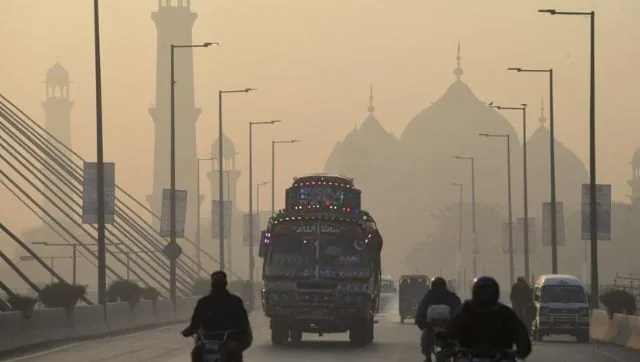Lahore smog: what is polluting air in the Pakistani city
[ad_1]
While crop burning in India is blamed for the ‘Lahore smog’, experts suggest it isn’t the culprit.

Vehicles make their way through a smog covered Lahore on November 17, 2021. AFP
While citizens in India’s national capital Delhi reel under terrible conditions of air pollution, there is another city that was on Wednesday declared the worst polluted in the world. Lahore, in neighbouring Pakistan, is now in the spotlight for poor air quality as citizens in the city have asked the government to take stock of the situation and take action.
According to aqi.cn.org, an initiative under the World Air Quality Index project, the air quality index in Lahore stands at 373 at 11:45 am India time. This falls in the hazardous category.
The situation has affected people of the city who have pleaded with the government to find a solution. AFP quoted Ikram Ahmed, a shopkeeper, as saying, “We are poor people, can’t even afford a doctor’s charges.”
Akram’s remark comes in the backdrop of citizens facing physical symptoms from breathing polluted air.
“We can only plead with them to control the pollution. I am not a literate person, but I have read that Lahore has the worst air quality. If it continues like this, we will die,” he said.
On Thursday, Pakistan Twitter was abuzz talking about Lahore’s poor air quality.
The camera isn’t doing justice but while cycling I could totally feel it. #Lahore #Smog pic.twitter.com/5xmytCybSv
— Rao (@CasualRao) November 18, 2021
Lahore smog is making people terribly sick, respiratory diseases and throat and eyes infections are on the rise. How @PunjabGovtpk is addressing this? Saw large number of crops burning on motorway. Ab Covid or dengue is bach he gayay hain to khuda kay liyay #smog say na marain. pic.twitter.com/oLRgZqLOi3 — Nighat Dad (@nighatdad) November 17, 2021
What’s polluting Lahore’s air?
Much like Delhi, the conditions of air pollution in Lahore worsen during winters and crop burning season. Often, Pakistan has blamed stubble burning in India and some parts of Punjab in Pakistan for smog conditions in Lahore.
Like in Delhi, the situation has gotten worse over the past decade.
AFP reported that it is a mixture of low-grade diesel fumes, smoke from seasonal crop burn off, and colder winter temperatures coalesce into stagnant clouds of smog.
A report in Dawn.com in 2019 said that it was fuel burning and not crop burning by farmers in India that was the culprit for Lahore’s poor air. The report said, “The claim that crop burning in India causes smog in Lahore is not only without evidence, but it is statistically false with a very small correlation coefficient, illustrating the lack of scientific understanding required to deal with the crisis.”
It blamed the burning of “poor quality fuel” as the major reason for the bad air quality.
Another article in Dawn.com in 2015 had said that it was “created by increasing vehicular and industrial emissions.” This, the article said, also meant that even in the summer months, there was a “permanent haze” shrouding the city, with relief only during the rainy season.
Lack of data makes it worse
While the air quality in Delhi and surrounding regions have been written about and researched. The lack of data makes things worse. Ahmad Rafay Alam, an environment lawyer and member of the Pakistan Climate Change Council, wrote in The Print in 2019, “In Pakistan, there is a shocking dearth of research on the impacts of air pollution on human health.” He too mentioned that, unlike what the authorities in the country have said, crop burning in India isn’t the problem.
Alam isn’t alone in speaking about the lack of data regarding air pollution in Lahore.
In a 2019 report by The New York Times, Abid Omar, who leads Pakistan Air Quality Initiative that publishes data about air pollution, as saying, “I realized that in order for air quality to become a national conversation in the way it had in China and to raise awareness about hazards and solutions, we needed the numbers to be out there.”
What’s the government doing?
While residents of Lahore have blamed government apathy for their plight, ministers have said that they have taken action to curb air pollution in the country.
Muhammad Bashir Khan of and MP from the ruling Pakistan Tehreek-e-Insaf told DW, “We have come up with this idea of urban forests, which are being developed in different cities, besides cracking down on industries that are using old technologies.”
He said the country had also decided to abolish coal-fired plants, planting of trees and switch to the Euro 5 standard for all vehicles being produced in the country.
[ad_2]
Source link


Comments are closed.